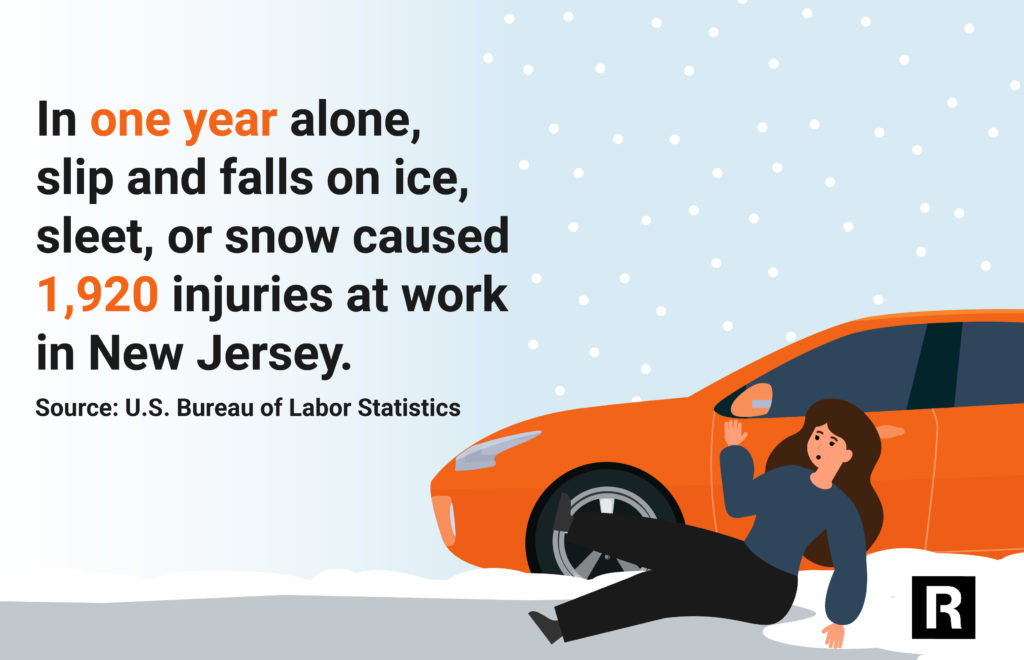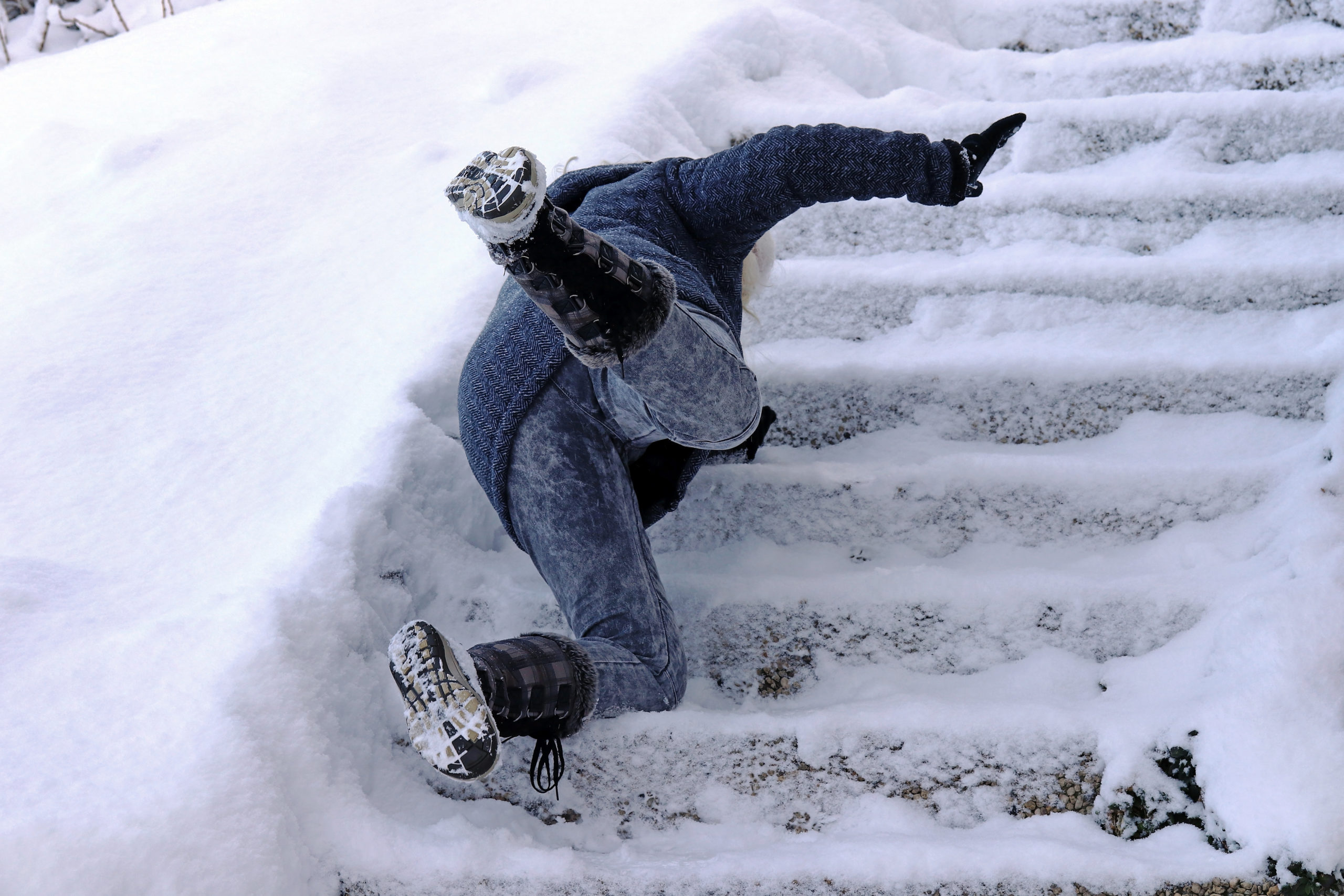New Jersey residents are no strangers to icy weather. Just last winter the state saw temperatures as low as 1°. That’s significantly colder than the 32° water needs to freeze and become deadly. While New Jersey dwellers are well aware of ice’s inconvenience, they might be less aware of its dangers.
Falling on ice can lead to serious injuries and even death.
Falls are the leading cause of emergency room visits nationally. A portion of those incidents were caused by icy conditions, which can happen anywhere. In one year alone, 42,480 injuries in the workplace were related to ice, sleet, or snow and required victims to take time off work. Studies show that 80% of all slip and falls due to snow and ice happen on sidewalks or in parking lots.

These accidents can cause serious injuries, such as broken bones, muscle sprains, and even brain damage. If you or a loved one has suffered an ice related slip and fall injury, you deserve compensation for your expenses – especially if the accident was caused by someone else’s negligence.
Premises Liability
A fall on ice can be a painful and overwhelming experience. It can be difficult to determine your next steps. Once you’ve received immediate medical attention and the shock wears off, you may find yourself wondering, “Who is responsible for my accident?”
The first question to ask when determining liability after an icy slip and fall is, “Where did the accident happen?” First, let’s consider that property is divided into two main categories: commercial and residential.
Commercial Property
Commercial property owners have a duty to maintain a safe environment. The Supreme Court of New Jersey states the law quite clearly that “commercial landowners are responsible for maintaining in reasonably good condition the sidewalks abutting their property and are liable to pedestrians injured as a result of their negligent failure to do so.”
This decision came from the case of Stewart v. 104 Wallace St., in which the victim tripped and fell on the sidewalk outside a local tavern. He suffered extreme injuries and underwent surgery. Before this case, the state did not require commercial property owners to maintain their sidewalks. In this decision, however, the court decided the previous policy “produces harsh and unfair results” and created a new precedent which placed more responsibility on property owners.
Residential Property
Residential property owners are generally less liable for ice-related slip and fall accidents on their land, especially if the ice accumulated naturally. If the ice formed as a result of the homeowner’s negligence, however, they may be liable for a pedestrian’s injuries.
In one case, a victim slipped and fell on a patch of ice located on the street outside of the defendant’s home and suffered a painful ankle fracture. Fortunately, he noticed that the ice patch had clearly been formed by the homeowner’s leaky gutter, which was draining onto the street. He took the homeowner to court. The first court did not side with him but he brought it to a higher court which agreed that the homeowner was liable for the accident.
In another New Jersey case, a woman visited the home of an acquaintance to pay her for dinner tickets. On her way out of the house, she slipped and fell on the acquaintance’s icy driveway. She brought the case to the state court which ultimately deemed her to be an ‘invitee,’ of the host — meaning the host had a legal obligation to create a safe environment for her.
Relationship to the Property Owner
Your relationship to the property owner will play a significant role in your case. There are three types of relationships to consider when pursuing compensation after slipping and falling on ice: “trespasser,” “licensee,” or “invitee.”
Invitee
This is someone whom the property owner specifically invited onto his or her property for a lawful purpose. A contractor is a common example of an invitee. Invitees are the most protected type of property visitor.
Licensee
A licensee is someone who was permitted onto the property for a reason of mutual benefit, such as a social guest. Property owners have a duty of care to prevent licensees from being injured.
Trespasser
Trespassers are owed the least duty of care. Property owners are not expected to prevent harm to trespassers because it would be impossible to predict their arrival. Once detected, though, they may have a normal duty to avoid injuring them.
Options for Compensation
Compensation for your injuries after a slip and fall accident may come from different sources. Assuming you are eligible, we generally see three main paths to compensation for our clients: insurance, a lawsuit, or a settlement.
Insurance
There are two basic forms of insurance which could cover your injuries: homeowner’s insurance (if the accident took place on private property) or commercial property/general liability insurance (if the accident took place at a business.)
Any homeowner who has a mortgage must carry homeowner’s insurance. Homeowner’s insurance will usually include personal liability and ‘medical payments to others’ coverage. The medical payments portion is often limited to $1,000 per person, which is unlikely to cover the full cost of your medical bills.
Most businesses will carry commercial property or commercial general liability insurance. Once you file a claim with the business’s insurance, you will be assigned an insurance adjuster who will negotiate to give you the least amount of money possible. You will have to prove that the business was negligent and that they are obligated to pay your medical expenses. If you have a serious injury or are going up against a large corporation, it is in your best interest to hire a lawyer to handle these negotiations for you.
Lawsuit vs. Settlement
If the insurance company is being truly uncooperative or refuses to accept that the homeowner or business owner was negligent, you may be forced to file a lawsuit. At this point, you will need to hire a lawyer. We help our clients organize the evidence, collect all necessary documents and reports, and build a case that will hold up in court.
Often, once insurance companies receive notice that they are being sued, they will be more inclined to settle and avoid the expense of a trial. In our experience, most cases settle and never see a trial. Occasionally, a case will go all the way to the courtroom and a jury will decide who was truly at fault.
After the jury listens to the evidence and renders its verdict, the judge will decide how much money each party owes or will receive. New Jersey operates under a comparative fault rule, which means that even if you were partially responsible for the accident, you may still be entitled to compensation. That’s why it’s so important to hire an experienced personal injury attorney who specializes in this area of law.
Common Slip and Fall Injuries
Fractures
Breaking a bone is a painful experience. Patients who suffer fractures often require time off work, physical therapy, or even surgery. Serious fractures could lead to permanent disability.
A fall can break almost any bone in the body. Common ones include the pelvis (hip), ribs, wrists, and ankles. According to the National Floor Safety Institute (NFSI), “Of all fractures from falls, hip fractures are the most serious and lead to the greatest health problems and number of deaths.”
Older adults are at higher risk for complications after a fall. The NFSI reported that “falls account for 87% of all fractures among people over the age of 65” and “half of all elderly adults (over the age of 65) hospitalized for hip fractures cannot return home or live independently after the fracture.” The potential need for in-home care creates an additional financial burden for older victims.
Sprains
Fall victims often sprain an ankle if they tripped or sprain their wrist if they attempted to break the fall with their hands. Sprains may sound less severe than fractures but they can be just as painful and inconvenient. An ankle sprain can leave you on crutches for weeks, potentially unable to drive or use stairs. A wrist sprain can also prevent you from driving, typing at a keyboard, and performing everyday tasks. So while the medical treatment for sprains might be less expensive than more serious injuries, the loss in wages can be significant.
Head and Brain Injuries
Head and brain injuries are extremely traumatic. In one year alone, 47% of all brain injuries were caused by falls. Head injuries can include concussions, edema (swelling of the brain), hemorrhage, or diffuse axonal injury (damage to brain cells.) These injuries can result in debilitating and life-long issues such as seizures, difficulty balancing, and memory loss.
Spinal Cord Injuries
Over 17,000 Americans suffer spinal cord injuries each year, costing the country $9.7 billion in expenses. Spinal cord injuries can lead to paralysis, limited mobility, and intense pain. Spinal cord injuries often require surgery and extensive physical therapy.
Frequently Asked Questions
The “ongoing storm rule” allows property owners to wait until a winter storm has concluded before shoveling their property. However, this policy is not observed in New Jersey. The state supreme court recently clarified that “the commercial landowner has a duty to take reasonable steps to render a public walkway abutting its property—covered by snow or ice— reasonably safe, even when precipitation is falling.”
The statute of limitations on a slip and fall on ice case in New Jersey is two years. The limit for suing a public entity like the State of New Jersey, a city or town, however, is just 90 days.
If you were partially responsible for your accident you may still receive a financial award. New Jersey operates under a comparative fault model, which means the amount of money a party receives will depend on the extent to which they were at fault. New Jersey statute 2A:15-5.1 essentially states that a victim can receive compensation as long as his or her share of the blame was no more than 50 percent.
Who Should You Contact?
Falling on ice can be a devastating ordeal. The attorneys at Rosenblum Law have decades of experience winning substantial financial awards for slip and fall victims and their families. If you’ve been the victim of an ice-related personal injury, contact Rosenblum law by emailing or calling 888-883-5529 today.
Other Resources
- Premises Liability Law
- Slip and Fall Quick Facts
- Eliminating Slip/Trip & Fall Hazards in Parking Lots
- Homeowner Liability: Invitees, Licensees, and Trespassers










 888-815-3649
888-815-3649
